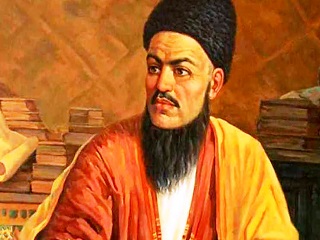 The book exhibition «Makhtumkuli Fragi is a Turkmen poet, writer, and thinker» dedicated to the 300th anniversary of the outstanding poet and philosopher of the East, classic of Turkmen literature Makhtumkuli Fragi, was organized in the hall of world literature.
The book exhibition «Makhtumkuli Fragi is a Turkmen poet, writer, and thinker» dedicated to the 300th anniversary of the outstanding poet and philosopher of the East, classic of Turkmen literature Makhtumkuli Fragi, was organized in the hall of world literature.
The book exhibition «Makhtumkuli Fragi is a Turkmen poet, writer, and thinker», dedicated to the 300th anniversary of the outstanding poet and philosopher of the East, classic of Turkmen literature Makhtumkuli Fragi, was organized in the hall of world literature.
A bright representative of lyrical poetry was born in the village of Khadjigovshan in the valley of the Atrek River near the southern slopes of Kopetdag. The first teacher of the future poet was his father, the famous poet, theologian Dovletmamed Azadi, who wrote the famous philosophical treatises «Vagzi-Azad» («Free Sermon»), «Behishtnama» («Book of Paradise»), etc. Makhtumkuli studied at the Shirgazi Madrasah in Khiva. He also spent some time at Ibris baba madrasah in Lebap Velayat and Kokeldash in Bukhara.
During his stay at the madrasah, he mastered all the riches of classical poetry of the East, motifs and images that he subsequently created with remarkable strength and freshness in his own work. He was also familiar with the works of Persian-speaking poets-Hafiz, Jami, Rudaki, Khayyam, Rumi and many others.
Makhtumkuli's creation is the pinnacle of the Turkmen poetic classics. His patriotic and humanistic ideas, calls for the unity of the Turkmen tribes had a strong influence on his contemporaries. Socio-philosophical motives occupy an important place in Makhtumkuli's lyrics. The poet's work had a strong influence on the development of Turkmen poetry in the subsequent period. His poems and small poems, close to folk art in language and poetic techniques, preserved by the memory of the people, have become sources of wisdom and poetic inspiration for posterity up to the present day.
Makhtumklui's poems reflect the poet's extensive knowledge of both Turkmen folklore and the literature of neighboring peoples - Uzbeks, Tajiks, Persians, Azerbaijanis. Turkmen folklore had a special influence on the poet's work. His poems are full of proverbs and sayings. Makhtumkuli is the first Turkmen poet who used the so-called goshgah (syllabic quatrain), which are very widespread in the folklore of the Turkic-speaking peoples, as the main genre form in poetry.
The poems of the great humanist poet Makhtumkuli have been translated into many languages of the world. European researchers and readers first got acquainted with the poems of Makhtumkuli through the publication of A.Khodzko-Boreyko «Three Songs of the Turkmen Makhtumkuli», published in London in 1842 and A.Vambery, published in Leipzig in 1878. The first Russian translations of his poems were published by F.A.Bakulin in 1872 in the German magazine «Archive of Science and Culture of Russia».
The universal significance of the work of the famous master of the word is evidenced by the proclamation by the International Organization of Turkic Culture (TURKSOY) of 2024 as the «Year of the Great Poet and Thinker of the Turkic World -Makhtumkuli Fragi», as well as the inclusion of a collection of his manuscripts in the International Register of the United Nations Educational, Scientific and Cultural Organization (UNESCO) Program «Memory of the world». In addition, the 300th anniversary of Makhtumkuli Fraga is included in the UNESCO list of memorable dates for the period 2024-2025. This initiative of Turkmenistan was approved at a meeting held in Paris in May 2023. The sessi of the UNESCO Executive Council.
Books and literature about him in different languages of the peoples of the world are presented at the book exhibition from the fund of the National Libraries of the Republic of Kazakhstan.


